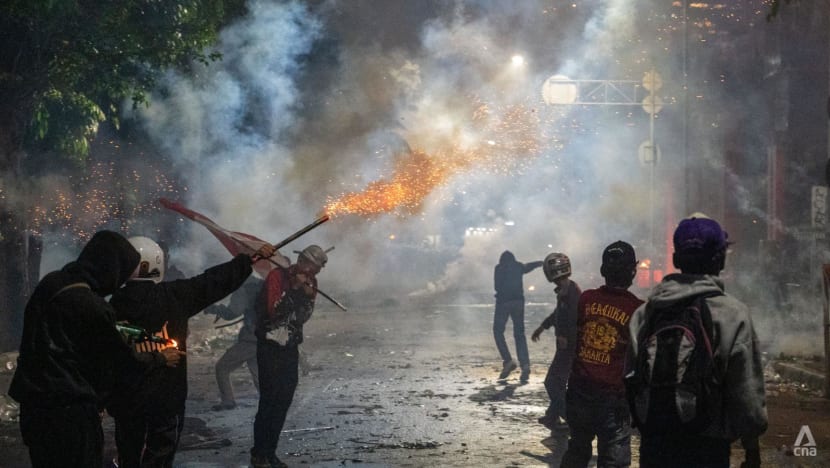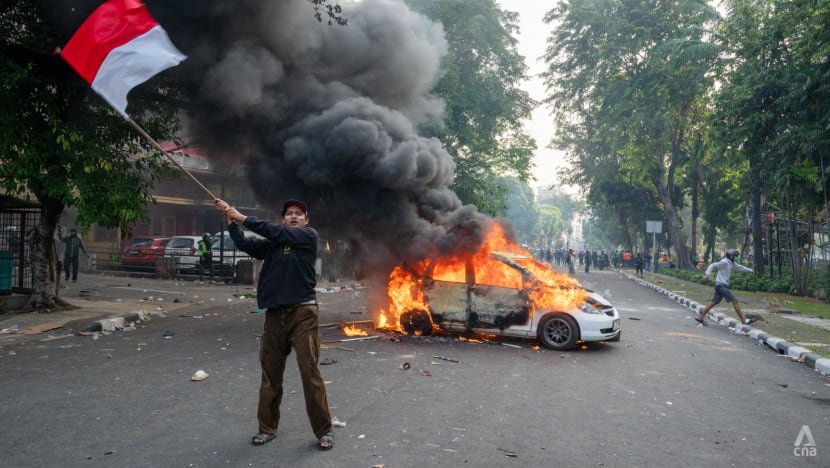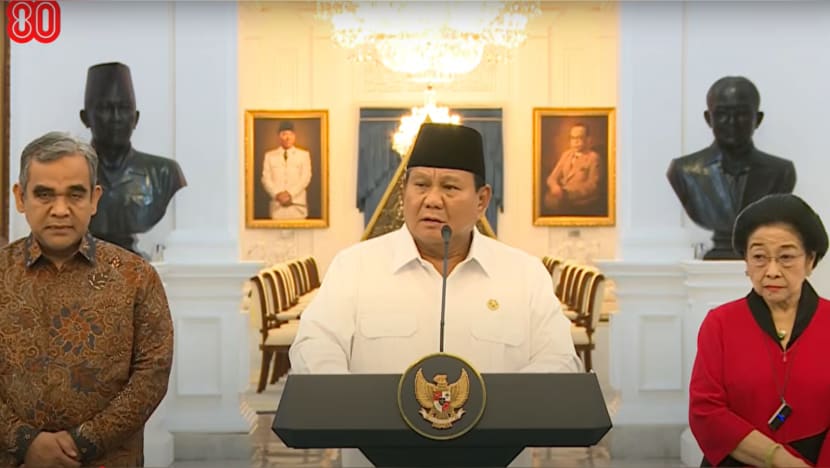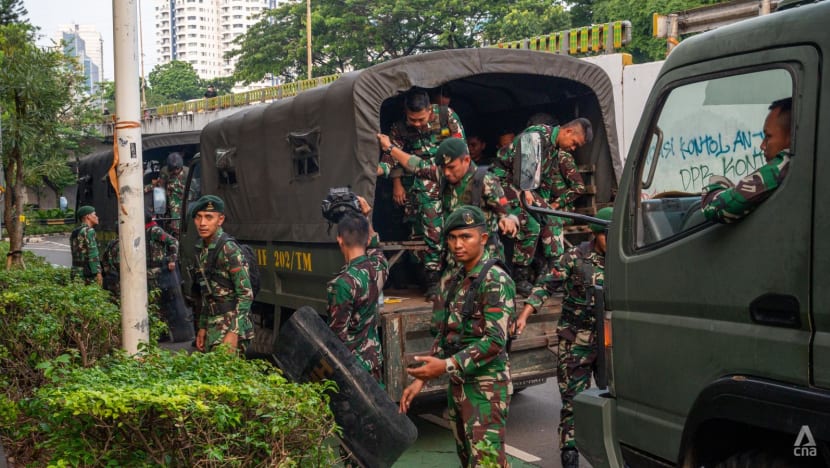analysis Asia
Prabowo’s bid to quell Indonesia protests welcomed, but root issues need to be tackled
At least six people have died in Indonesia since Aug 28 following public outrage after a ride-hailing driver was fatally run over by a police vehicle during a rally protesting extra lavish allowances for lawmakers.

Protesters set off firecrackers toward the Police Mobile Brigade Corps building in Kwitang, Jakarta, on Aug 29, 2025, following a deadly incident where a police vehicle ran over a ride-hailing driver. (Photo: CNA/Ridhwan Siregar)

This audio is generated by an AI tool.
JAKARTA: The weekend move by Indonesian President Prabowo Subianto to stage a united political front with leaders from other major parties in announcing steps to meet demands from protesters who have rocked the country in the last week is seen as one that is unprecedented in decades, analysts told CNA.
They added that Prabowo’s live broadcast on Sunday (Aug 31) was aimed at showing the political leaders of the various parties in parliament were accountable for their members’ statements and behaviours, though some felt the show of force might not go far enough to defuse public dissent.
Flanked by leaders of major political parties, Prabowo also said parliament would revoke with effect from Monday several controversial perks and privileges of the country’s lawmakers that have fuelled the protests, as well as suspend some errant ones.
The president had also cancelled a planned trip to China to attend a "Victory Day" parade on Sep 3 to mark the 80th anniversary of the end of World War II in a bid to monitor the volatile domestic situation.
In the wake of Prabowo’s announcement on Sunday, media reports on Monday morning said Indonesian students and civil society groups had called off protests.
But later in the day, thousands of Indonesians reportedly continued to rally across the country, with at least 300 protestors seen outside the nation's parliament as soldiers looked on.
Aditya Perdana from the University of Indonesia said the move to suspend troubled lawmakers as well as to revoke some of the perceived luxurious perks is a first attempt by Prabowo to temper the situation in the country.
“It is a first step, but whether they will be effective, we will have to see. We have to start with that,” said the political analyst.
Analysts whom CNA spoke to said that while they acknowledge Prabowo’s attempt to calm the situation, more needs to be done to stop the violent protests and anarchy in the archipelago, even as the government needs to identify and work towards addressing the core issues that led to this boiling point.
Some are of the view that the president’s intervention may not be enough to calm the streets, where at least six people have reportedly died since Aug 28. The latest fatality: A 20-year-old student in Yogyakarta who died during a protest on Sunday, although the circumstances of his demise remain unclear.
The widespread protests, which began in Jakarta over economic issues such as job losses, intensified after news of a new monthly housing allowance for lawmakers. It blew over after a ride-hailing driver was run over by a police vehicle on Thursday night.
The death of 21-year-old Affan Kurniawan prompted angry crowds across the country to target, among others, police stations and parliament buildings.
Over the weekend, angry demonstrators also looted the homes of some lawmakers they perceived to be insensitive to the plight of the public. The residence of Finance Minister Sri Mulyani was among those looted.

On Monday, Jakarta’s Police Chief Asep Edi Suheri said over 1,200 people have been arrested in relation to the widespread anarchy in Jakarta over the past week.
Made Supriatma - a political expert and visiting research fellow at Singapore's ISEAS-Yusof Ishak Institute - told CNA that the current demonstrations stemmed from what he perceives to be the government’s own policy-making failures, especially on the economic front.
“If we compare this with 1998, the cause is the same. Now, there’s also an economic crisis ... (but more so caused) by the government’s own policies,” he said, adding that issues like financial cuts made to regional governments and an increase in property tax were the sparks that ultimately led to the full-on demonstrations.
PRABOWO’S SHOW OF STRENGTH
On Sunday, Prabowo also warned that some of the demonstrations had moved beyond what he considered peaceful and may amount to “treason and terrorism”.
He had also ordered the police and the armed forces to take action against those found to be looting or inflicting property damage.
Standing next to him were leaders of major Indonesian political parties, including Megawati Soekarnoputri, who is the chairman of the Indonesian Democratic Party of Struggle (PDI-P).
PDI-P is not a member of Prabowo’s big tent coalition - the Advance Indonesia Coalition or commonly known as KIM Plus.
Others included Golkar chief Bahlil Lahadalia, National Democratic Party (Nasdem) chair Surya Paloh and National Awakening Party (PKB) leader Muhaimin Iskandar, alongside House Speaker Puan Maharani and Senate Speaker Sultan Bachtiar Najamudin.

Aditya from the University of Indonesia, for one, said that having the various leaders appear alongside Prabowo in the live broadcast was necessary because their members were the targets of people’s anger.
“These political parties have their representatives in the parliament, so the logic is (that in order) to legitimise (Prabowo’s) statements, they (the party leaders) have to be present,” he said.
Meanwhile, political analyst Nicky Fahrizal from the think tank the Centre for Strategic and International Studies (CSIS), said that it is up to the individual political parties to revoke the membership of its members.
“If a serious enough violation occurs, a member will be recalled by the party,” said Nicky, appreciating the presence of the political party heads at Sunday’s broadcast.
However, Made told CNA that a show of force by the leaders of the various political parties is not enough to quell the public’s anger.
Made said that decisive action needs to be taken by Prabowo such as removing the police chief - whose men had run over Affan last Thursday - or even a change in Cabinet members.
Seven police officers have been found to have violated a professional code of ethics and an investigation into Affan’s death has since been launched.
Made believes that there is no need for the president to consult with the various political leaders on his next moves to deal with the situation at hand.
“(Prabowo) is the head of the government and he should be the one making the decisions. The government is not run by political party heads,” he said.
ROOT ISSUE OF UNHAPPINESS NEEDS TO BE TACKLED
Despite the government's latest move and measures, analysts predict that protests are still to be expected in the upcoming days.
“The potential for further demonstrations or anarchy is still there if the public is still disappointed,” said Aditya from the University of Indonesia. “If it can be resolved, it may change.”
Meanwhile, analysts called on the government to immediately address the root causes that led to the widespread protests last week.
“Improve government performance and policy quality,” said CSIS’ Nicky. “This also includes revitalising public participation. That's what is needed.”
For his part, Prabowo on Sunday said that he had asked the leaders of the House of Representative to immediately invite community leaders, student leaders, and groups who wish to express their aspirations “so they can be well-received and engage in direct dialogue”.
Made, who is the analyst from Singapore’s ISEAS-Yusof Ishak Institute, said the problem is that the government’s policies have not improved the lives of many Indonesians, especially those who are from the lower-income group.
Many in the country of 280 million people still struggle to make ends meet, living on a minimum wage of about 3.3 million rupiah (US$200) per month.

Indonesia currently has about 7.3 million jobless people. Meanwhile, the country is also seeing a shrinking middle-class population.
“But the people see elites, members of parliament like Eko Patrio whose house is worth 150 billion rupiah …and then they get a lot of protection and perks, while people at the bottom find it very difficult to live,” said Made, referring to lawmaker Eko Patrio whose house was among those looted on Saturday.
Former celebrity-turned-politician Eko has been suspended by the National Mandate Party (PAN) from being a parliamentarian effective on Sep 1. PAN also suspended Uya Kuya, another celebrity-turned-politician, after both were deemed to have made insensitive comments that triggered the widespread public outrage.
Nicky from CSIS said there are three main issues Indonesia is currently facing: Economic, political as well as law and order enforcement.
Similar to Made, he noted how many people in Indonesia are still struggling to survive on a daily basis and that many are unemployed, adding that there is a disconnection between what the people want and what policies lawmakers decide.
“We know for certain that meaningful public participation is only a jargon,” said Nicky.
“Every policy-making process simply doesn't involve the public, and the public’s outcry in the past (few) days shows that there is a breakdown in political or public communication from the government, from the House of Representatives to the public.”
For now, Nicky acknowledged that Sunday’s announcement is effective to cool down the situation temporarily but reiterated that deep-rooted issues need to be solved for Indonesia to move forward.
“And if you want to resolve public anger, it means the fundamental problems must be resolved, and this starts from eradicating poverty and unemployment.”



















